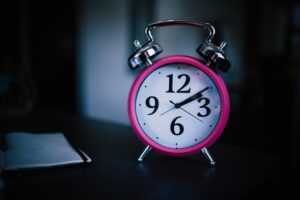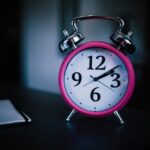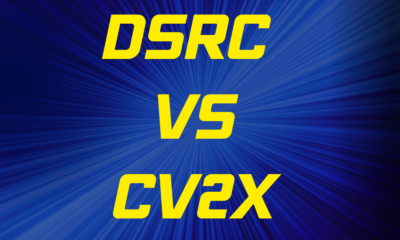Cardiology
Home Sleep Apnea Diagnostic Devices and the Benefits of the WatchPat
Published
5 years agoon
By
Ally LermanConducting a sleep apnea diagnosis at home was unheard of earlier when people suffering from the problem of sleep apnea had to visit clinics which had been established for the testing. People also encountered various difficulties when undergoing the tests because the CPAP machine being used was intrusive and caused discomfort to the patient. People also had to spend huge amounts of money on the tests and wait for a considerable period of time before they could obtain the results and begin treatment for the condition of sleep apnea. Things changed dramatically after WatchPat was introduced as a wrist-mounted device which was cleared by the FDA for the diagnosis of sleep apnea disorders. The WatchPat device allowed patients to be tested from the comfort of their home. This was perhaps the primary benefit of this device as it did not require patients to travel long distances and wait for a considerable period before they could even understand whether they were suffering from sleep apnea disorders.
WatchPat has received clinical validation against the gold standard polysomnography with a verified correlation as high as 90% to PSG. The tests being conducted by using WatchPat have been recommended by the leading cardiologists in the USA and include notable personalities such as Prof. David Vorchheimer and Dr. Larry Chinitz as a convenient device for home sleep monitoring for the diagnosis of sleep apnea from home.
The innovative use of technology has ensured that WatchPat can offer unparalleled performance, satisfaction, and reliability both for healthcare professionals and patients. Among other methods of testing for sleep apnea, WatchPat is the easiest device which can be used for the home sleep apnea diagnosis. It is as simple as wearing a wristwatch with no requirements of wires or nasal cannulas like the traditional machines. The simple usage of the device leads to a minimal rate of failure and outstanding compliance.
WatchPat is a cost-effective device which needs minimal preparation, cleaning, or handling before and after being used by the patient leading to man-hours being saved. Even better is the fact that the device generates automated reports within minutes to increase the efficiencies of the workforce and make it possible for the clinicians to recommend treatment at the earliest.
WatchPat is the sole HST [non-EEG] device which can measure true sleep time rather than simply consider the total recording time to provide sleep architecture which is comprehensive. The peripheral arterial tone [PAT] is used by WatchPat for functioning. Arterial volume changes at the fingertip are measured by PAT to reflect the sympathetic nervous system activation.
WatchPat is the only device which is simple, accurate, fast and reliable and is being used throughout the globe for conducting sleep apnea diagnosis especially for patients that are reluctant to get themselves diagnosed because of the difficulties they face when opting for the in-lab sleep test. WatchPat sleep study has not only been cleared by the FDA but has also received a number of recommendations from leading cardiologists who are all confirmed the veracity of this device in providing accurate results which can improve the quality of life of patients with cardiovascular problems. The lightweight structure of WatchPat makes it a sleep apnea device which is convenient for use both by clinicians and patients not just for the diagnosis of sleep apnea but also to provide early and efficient treatment to the patients. This device has taken away the concerns of visiting clinics for the testing of sleep apnea along with the costs which were associated for patients that often preferred to ignore the advice of their cardiologists and preferred to suffer from the problem of sleep apnea.

You may like
Cardiology
Heart disease correlation with Sleep Apnea
Do you often find yourself waking up feeling tired and groggy, even after a full night’s sleep? Or have you been told that you snore loudly or gasp for air during the night? If so, it might be time to pay attention to a potential correlation between heart disease and sleep apnea. In this blog post, we will delve into the fascinating connection between these two seemingly unrelated conditions and explore how addressing your sleep apnea could have profound implications for your heart health. So grab a cup of coffee, get comfortable, and let’s dive into this eye-opening topic together!
Published
4 years agoon
August 4, 2021By
Ally LermanHome Sleep Monitors; diagnosis and monitoring of sleep apnea
Sleep apnea is not well known with people thinking that it involves having a nasal band put on you at night to stop you snoring, unfortunately it is highly dangerous to your health both directly and indirectly with over 80% of sufferers having no idea of the issues involved. There are two forms of sleep apnea with one involving the physical obstruction of the throat by the weight of relaxed muscles or fat in the neck, or caused by inflammation from smoking, drinking or infections. The other is related to intermittent signalling from degenerative diseases such as Parkinson’s stopping breathing muscles from working. In addition to this some people, a minority suffer from both. Thankfully obstructive sleep apnea is the easiest to treat and assisted by home sleep monitors.
The main challenge with sleep apnea is that a sufferer becomes tired and confused over time due to lack of REM sleep due to excessive movement to free the obstruction during the night. This can lead to death or harm to the sufferer or other people.
Heart Disease and Sleep Apnea
To make matters worse there is a strong correlation between sleep apnea and heart disease which is often overlooked. At present medical teams are being trained to look out for signs of sleep apnea due to this correlation, because a person with sleep apnea is much more likely to require readmittance into hospital after being treated for heart disease related illnesses. Interestingly if diagnosed with sleep apnea patients can also be identified as being at risk of heart disease and treated before irreversible cardiovascular damage occurs.
To do this successfully insurance companies and healthcare providers are turning to sleep study monitors to assess sleep apnea for patients due to the scarcity of overnight observation facilities and sleep specialists, it is far cheaper for successful diagnosis, faster to investigate and provides far more data for assessment. A sleep study monitor provides a triple win between the patient, the insurer and the stretched healthcare.
Sleep apnea sufferers receive much lower oxygen content in the bloodstream, this can cause hypertension and a change in blood pH while reducing the nitric oxide formation at the cardiovascular cell wall. This all accelerates cardiovascular hardening, hypertension and associated heart disease. The cardiovascular system regulates plasma flow from the bloodstream to and from cells in the body. This reduction of elasticity not only makes it worse for cells to get oxygen, but also allows arterial furring to occur. This constricts and builds up lipids and blood cells; rapidly increasing the risk for a stroke to occur.
If caught early this hardening of the cardiovascular walls is reversible within a one-month timeframe, however after this time is irreversible and problematic to treat. A home sleep monitor can help assess sleep apnea and by proxy helps with assessing cardiovascular disease.
Why you need a home sleep monitor
Sleep apnea is extremely difficult to diagnose without use of a sleep study monitor. Symptoms include loud snoring, a gasping or choking during the night and over 80% of sleep apnea sufferers dismiss it as just a bad night. In addition, hypertension and cardiovascular diseases are also difficult to diagnose in time, however as there is a strong correlation between both issues, a sleep study monitor could save you costly medical treatments or your insurers. Being proactive with your health can save you from major surgeries or death so a home sleep monitor should be always near your bedside. They can be the size of a wrist watch and have auto generating report functionality that can send your general practitioner reports and provide easy to read information for your own interest. They monitor blood oxygen, body positions, REM sleep durations, breathing and snoring and gasping events giving the healthcare professional everything they need to monitor your condition.
Cardiology
The Accuracy Of Home Sleep Study Companies
Published
4 years agoon
April 7, 2021By
Ally LermanSleep is one of the most important factors of life that boosts a person’s health and well-being. If you don’t get enough sleep, you will feel out of sorts and may lose your productivity as well. Unfortunately, some people don’t realize that they are not getting enough sleep and if they do realize it, they have no idea why it is happening.
A simple solution to this problem is to monitor your sleep. It can be done via a lab equipped for the same or from the comfort of your home.
Which One Should You Go For?
Most people prefer home tests over lab tests due to the following reasons:
They are convenient.
They are nearly as accurate.
These tests can be done on bedridden or wheelchair-bound person.
These tests are non-invasive.
You get the results at home too.
Most doctors accept the results.
Which Test Method is the Best?
Though there are many types of sleep apnea tests and they all have their own benefits, one of the most recommended is Peripheral Arterial Tone – PAT that measures and analyses in a non-invasive manner. This test maps the changes in the pulsatile arterial volume of a patient and offers a window to cardiovascular system as well as the sympathetic branch of the autonomic nervous system.
Role of Cardiologists in Home Sleep Testing
Many people wonder that what cardiologists have to do with home sleep testing. The fact is that your sleep, especially interrupted sleep can have a bad effect on your cardiovascular health. This is the reason for the popularity of home sleep study companies recommended for cardiologists. If sleep issues, especially obstructive sleep apnea is not diagnosed and resolved promptly, it can harm the heart health of a person and may lead to heart failure or a stroke in worst cases.
How to Select the Best Home Sleep Study Companies Recommended for Cardiologists?
As there are many home sleep study companies recommended for cardiologists, one may find it difficult to select one of them. Here some features of a company that you might want to go for. You can also use these features as a yardstick to measure various companies.
A good company would be founded and led by cardiologists and sleep medicine experts.
It will have at least a decade of experience and it will ensure deep knowledge regarding sleep issues.
It will be involved in research and development initiatives and will make sure that new products, solutions are created as often as possible.
The company would not only help in warning people against the cardiovascular side effects of sleep issues but will also help people with an existing cardiovascular issue to improve sleep so that the cardio health doesn’t deteriorate further.
A good company will also develop solutions that are cost-effective so that the masses can access them with ease.
It will also have a presence across the globe and would make every effort to reach people across geographical boundaries.
Conclusion
It is hoped that you now realize that home sleep study is a beneficial deal because it helps people with heart troubles to control the side effects of sleep issues from harming the heart health and it ensures that people who don’t have heart troubles don’t develop them as a result of sleep issues.

Cardiology
Sleep Study Companies And How They Work
Published
4 years agoon
December 14, 2020By
Ally LermanSleep study companies play a vital role in helping doctors and clinics to study their patients suffering from sleeping disorders. Sleep studies are majorly performed at the sleep centers but with the advent of mobile technology, sleep study companies such Cardio sleep solutions as now provide with tools and equipment that allows patients to conduct a sleep study of themselves from the comfort of their home. A sleep study, also known as polysomnography, help doctors and sleep specialist diagnose sleeping disorders, such as REM sleep behavior disorder, nighttime behaviors like sleepwalking, insomnia, restless leg syndrome, narcolepsy, periodic limb movement disorder, and sleep apnea.
Sleep apnea is the major cause of conducting sleep studies and patients are advised to go to sleep study companies for diagnosis and tests.
How does it work?
A sleep study is an overnight, non-invasive exam that allows sleep specialists to monitor the patient while they sleep. This is done to determine how the brain and body are functioning when the patient is asleep. For the sleep study, the patient will have to visit a sleep study company. A sleep lab is set up for the overnight stay.
Sleep study companies are equipped with all the necessary sleep monitoring tools and equipment. When you are asleep, an EEG machine monitors your cycles of nonREM and REM sleep along with sleep cycles during the night. The study also gauges the body movements, snoring, breathing rates, oxygen levels in your blood, and eye movements, among other things through sensors. You can be rest assured that the process is completely non-invasive and there are no needles involved.
A sleep study center or company boasts a sleeping room that is designed to make the patient feel comfortable. The sleep study room is essentially dark. In most cases, the sleep specialist will ask you to come to the center at least two hours before bedtime. You are allowed to bring all your sleeping essentials, such as your pajamas, and other items related to sleep. The reason why you are called early before your sleep is that the clinical staff will places electrodes and sensors all over your body so that everything could be recorded and monitored properly. While you may think that the wires and cables will hinder your sleep, these equipment are designed in such a manner that they give you plenty of room to move and get comfortable during sleep. In short, the machines won’t bother you during your sleep.
The clinical staff will monitor you during your sleep and if you face any complications like if you are infrequently breathing, he/she will assist you with a breathing aid. Even if you want to go to the bathroom, you will be assisted.
In most cases, a full night’s study is not needed. The equipment can gather all the necessary information about your sleep from a few hours of your sleep.
The data retrieved from your sleep study is taken by the sleep specialist and later reviewed by the concerned doctor. The test results may take at least two weeks to come up. After that, you will have to visit your doctor with the report to discuss the issues (if any).
While you can take a sleep test at home as the sleep study company will provide you with all the necessary equipment to take home and set up a sleep lab in your bedroom, self-reports don’t paint a reliable picture. If you want your sleep test to be accurate, it must be taken under the supervision of an experienced sleep specialist who will monitor you throughout your sleep.
How to prepare for your sleep test?
Your sleep specialist will prescribe you to take certain measures before your sleep test. A sleep test is usually taken between 8 pm and 10 pm. So, you should follow your regular routine and diet as much as possible. However, make sure that:
You don’t consume caffeine in any form starting from the lunchtime
You don’t consume alcohol or any element that will give you any sort of ‘high’
You keep your hair clean. If you use any hair product, wash your hair with shampoo as these products can interfere with sleep recording
You don’t take a nap during the day
You tell your sleep specialist about the medications you take because you might have to stop taking them for one for your sleep test Sleep Study

Sleep Study

Drone-UAV RF Communication: The Backbone of Modern Aerial Operations

OTP Verification at Scale with VoIP Smart Support

From Cloud to Edge: Object Detection Gets an Upgrade
Trending
-
Marketing & Analytics2 years ago
A Complete Guide To HubSpot’s New B2B Marketing, Sales Hub, and Prospecting Tool
-
3D Technology2 years ago
3D Scanner Technology for Android Phones: Unleashing New Possibilities
-
Marketing & Analytics2 years ago
How SMS Services And Software For Bulk SMS Sending Can Help Your Business Grow
-
3D Technology2 years ago
Mobile 3D Scanners: Revolutionizing 3D Scanning Technology
-
3D Technology3 years ago
3D scanning technologies and scanning process
-
Business Solutions1 year ago
Understanding A2P Messaging and the Bulk SMS Business Landscape
-

 Business Solutions1 year ago
Business Solutions1 year agoThe Power of Smarts SMS and Single Platform Chat Messaging
-

 Automotive2 years ago
Automotive2 years agoDSRC vs. CV2X: A Comprehensive Comparison of V2X Communication Technologies




